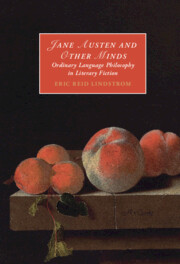Book contents
- Jane Austen and Other Minds
- Cambridge Studies in Romanticism
- Jane Austen and Other Minds
- Copyright page
- Contents
- Acknowledgments
- Abbreviations
- Introduction
- Chapter 1 Austen and Austin
- Chapter 2 Intelligible Community
- Chapter 3 Sense and Sensibility and Suffering
- Chapter 4 Pride and Prejudice and the Comedy of Perfectionism
- Chapter 5 Perlocutionary Entailments
- Chapter 6 Emma and Other Minds
- Chapter 7 Persuasion, Conviction, and Care Jane Austen’s Keeping
- Notes
- Bibliography
- Index
- Cambridge Studies in Romanticism
Chapter 5 - Perlocutionary Entailments
Published online by Cambridge University Press: 04 November 2022
- Jane Austen and Other Minds
- Cambridge Studies in Romanticism
- Jane Austen and Other Minds
- Copyright page
- Contents
- Acknowledgments
- Abbreviations
- Introduction
- Chapter 1 Austen and Austin
- Chapter 2 Intelligible Community
- Chapter 3 Sense and Sensibility and Suffering
- Chapter 4 Pride and Prejudice and the Comedy of Perfectionism
- Chapter 5 Perlocutionary Entailments
- Chapter 6 Emma and Other Minds
- Chapter 7 Persuasion, Conviction, and Care Jane Austen’s Keeping
- Notes
- Bibliography
- Index
- Cambridge Studies in Romanticism
Summary
Chapter 5 engages with a larger transhistorical discourse of female personhood, considering how the challenges that accompanied Austen’s public status are echoed in the reading and reception history of Mansfield Park. I move this discussion back to the 1772 Mansfield Decision, and forward to consider the controversy surrounding the far less momentous twenty-first century decision to place Austen on a British bank note. The open-ended, improvisatory, and uncontrollable nature of feelingly impactful speech links cultural and critical conversations to what J.L. Austin calls the perlocutionary realm of performative language. Perlocution, the dimension of language that most signals organizational breakdown, bogging down the progress of J.L. Austin’s official speech-act theory, is also the dimension or capacity of language through which paratextual literary encounters – allusions, conversations, revisions, and eventful readings – persist. This concern with doing things by our words as well as in them evokes a central feature of the enterprise of literary criticism altogether, I argue. For Cavell, the very mood and project of criticism is praise open to rebuke.
Keywords
- Type
- Chapter
- Information
- Jane Austen and Other MindsOrdinary Language Philosophy in Literary Fiction, pp. 131 - 160Publisher: Cambridge University PressPrint publication year: 2022



